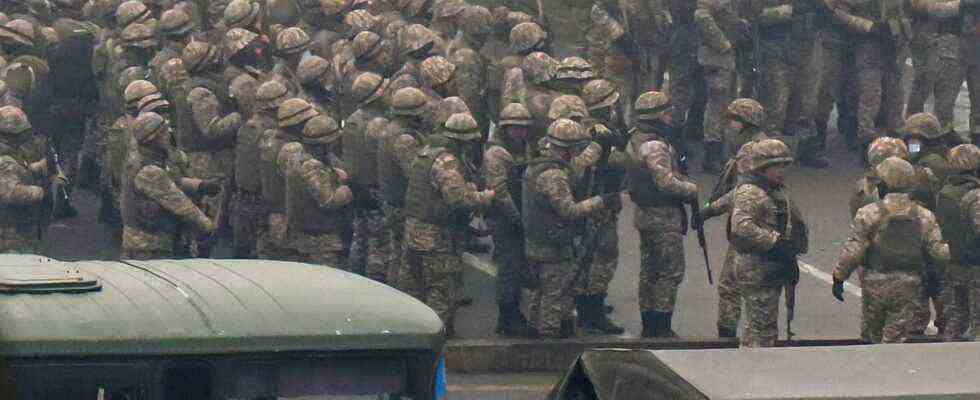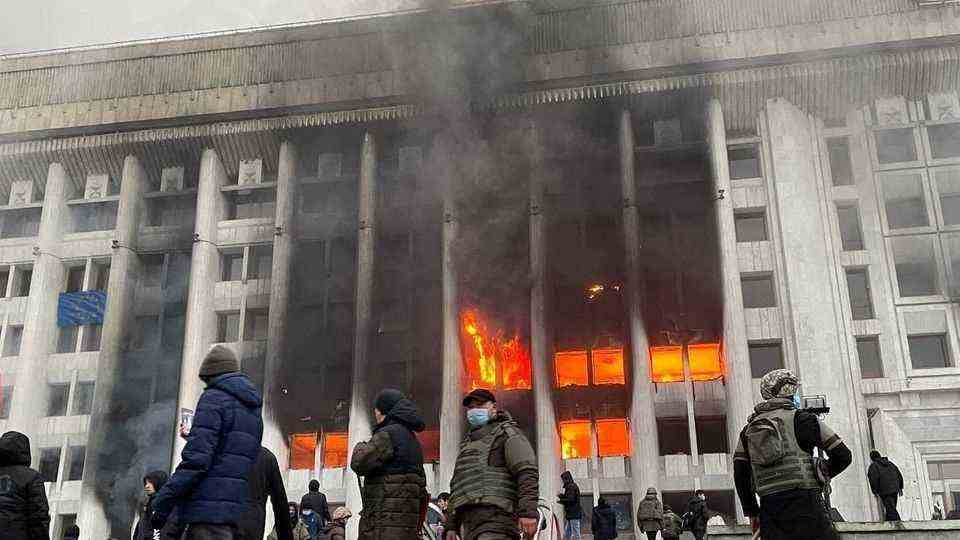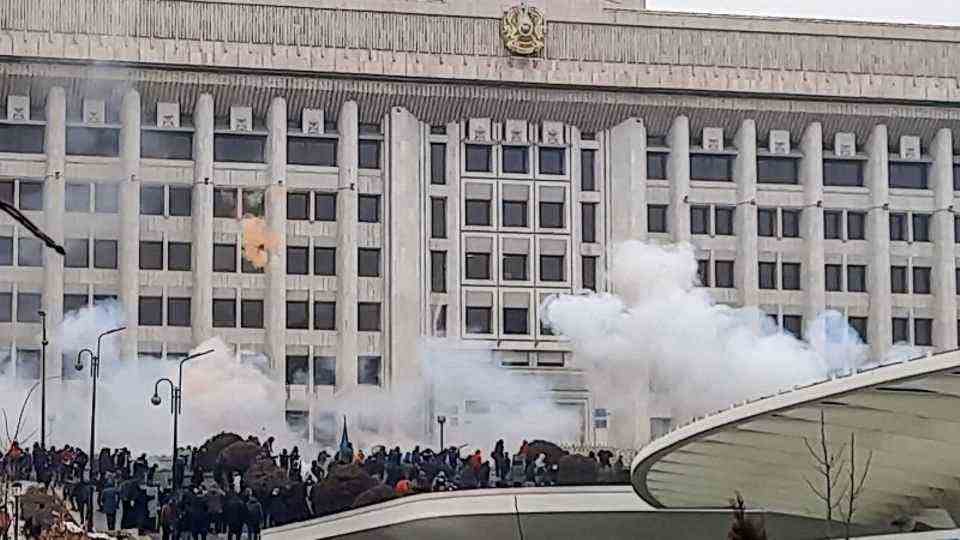Protests against the regime
Fear of invasion grows: a Russian-led military alliance sends soldiers to Kazakhstan
Almaty, Kazakhstan: Military forces gather to crack down on protesters
© Valery Sharifulin / Picture Alliance
Street battles with security forces, buildings on fire and a badly ailing government that is about to resign. Kazakhstan has slipped into a deep crisis. The President calls on Russia for help. And is heard.
The sending of foreign soldiers to Kazakhstan by a Russian-led military alliance is fueling fears of a further escalation of the situation in the former Soviet republic. It was said that the soldiers of the Alliance were to be deployed for a limited period of time “to stabilize and normalize the situation in the country”. However, the Kazakh government sought this help after its own troops used gun violence against demonstrators critical of the government. The US and EU called for moderation on all sides and called for a peaceful settlement of the conflict.
The trigger for the biggest wave of protests in years was resentment at the significantly higher fuel prices at the country’s petrol stations, especially since Kazakhstan has been suffering from mismanagement and poverty for years. In response to the protests, some of which were violent, President Kassym-Jomart Tokayev dismissed the government before the military intervened in the metropolis of Almaty on Thursday night. “Terrorist gangs” fought there with paratroopers, said Tokayev in a televised address. He blamed “domestic and foreign provocateurs” for the chaos.
Russia uses the myth of outside interference
Tokayev called on the Russian-led military alliance Organization of the Collective Security Treaty (CSTO), which promptly announced the dispatch of soldiers – so-called peacekeepers. In addition to Russia and Kazakhstan, the alliance also includes Armenia, Belarus, Kyrgyzstan and Tajikistan. The chairman of the Russian State Duma committee responsible for affairs of the former Soviet republics, Leonid Kalashnikov, told the Russian news agency Interfax that Russia was obliged to help and that the alliance had been established for this purpose.
The unrest that broke out at the weekend was “not a threat, but an undermining of the integrity of the state,” said Tokayev, explaining the decision. According to the authorities, several police officers and soldiers were killed in the unprecedented protests. However, due to the lack of free media, there is a lack of independent reporting on site – and videos in social networks suggest that there may have been a number of civilian victims about whom the authoritarian leadership of the country is largely silent. It also remained unclear how many demonstrators were arrested.
Kazakhstan’s leadership calls protesters terrorists
The Kazakh television station Khabar 24 announced in the morning that the security forces would continue to crack down on demonstrators. “The anti-terrorism operation to restore law and order will continue in Almaty,” it said. The Russian state agency Ria Novosti reported that military vehicles had collected bodies in the city. Banks have also stopped working for the time being.
The Kazakh media had previously reported that the city’s airport, which was occupied by a crowd of protesters and severely damaged, had been “liberated” after several airlines canceled flights to Almaty. According to the Russian space agency Roskosmos, security measures have been strengthened at the Baikonur spaceport.
The information situation is made more difficult by repeated blockages of the Internet in Kazakhstan. The network was shut down for hours on Wednesday – presumably to make new meetings more difficult. Several television stations stopped operating. On the night of Thursday, the websites of authorities, police and airports were again inaccessible, as the Russian state agency Tass reported. Internet sites such as the state news agency Kazinform and other media were also not available from Germany.
According to Tass, there was a complete internet failure in Almaty, which paralyzed social networks as a central coordination tool for demonstrators. The mobile network in the economic metropolis was also dead.
Several countries, including the US and the EU, called for a peaceful solution. “We ask all Kazakhs to respect and defend the constitutional institutions, human rights and freedom of the press, including restoring Internet access,” said US State Department spokesman Ned Price. The EU’s External Action Service also expressed concern about the serious unrest in Kazakhstan and called on the government to comply with international obligations and the fundamental right to peaceful protest.
The Central Asian country with more than 18 million inhabitants was ruled for decades by the ruler Nursultan Nazarbayev and borders among others with Russia and China. It is rich in oil, gas, and uranium. In Reporters Without Borders’ press freedom ranking, Kazakhstan ranks 155th out of 180 countries.



